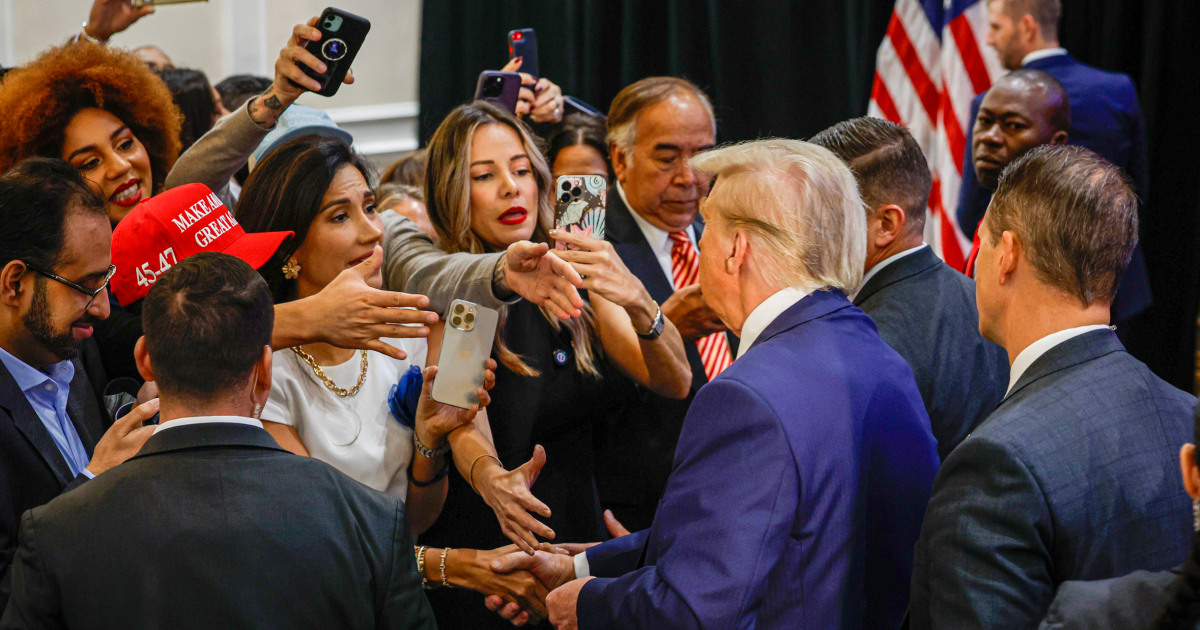
After Republican President-elect Donald Trump’s dramatic performance with Latino voters, a coalition of Democratic-leaning Latino groups is grappling with the shift and trying to reconcile it with the policies they say many Hispanics support.
The groups challenged just how large Trump’s gains were with people of color, particularly among Latino men, but acknowledged that the gains were significant, as was the Latino gender divide.
The recurring dispute over how well exit polling captures Latino voters — the groups and pollsters have raised it in previous elections — has ramifications for nonprofit groups that have focused on improving Latino voter turnout. These same groups also advocate for a Latino agenda that has been largely aligned with Democratic Party policies and for candidates and issues of equity. It also can affect their funding for those missions, something that is a continual struggle.
In no uncertain terms, economic discontent drove Latino men’s vote, said Clarissa Martinez de Castro, vice president of the Latino Vote Initiative for UnidosUS, a national Latino advocacy group whose social welfare arm, UnidosUS Action Fund, endorsed Vice President Kamala Harris.
“Republicans had a historic night, largely expressed through discontent with the economy. That was the most potent driver,” Martinez de Castro said in a conference call Tuesday.
“If there is a mandate here, it’s … to raise wages to bring down food, housing and health care costs, and that is particularly so for Hispanics,” she said.
Along with UnidosUS, Latino-focused advocacy groups such as Voto Latino, Somos Votantes, Hispanic Federation and La Brega y Fuerza Fund sponsored a poll of Latino voters. Additional sponsors included other groups focused on immigration, progressive causes or communities of color, such as America’s Voice, the American Civil Liberties Union, Asian Americans Advancing Justice, Climate Power and First Nations Development Institute.
 Donald Trump at the Latino Summit in October in Doral, Fla.Anna Moneymaker / Getty Images file
Donald Trump at the Latino Summit in October in Doral, Fla.Anna Moneymaker / Getty Images file
Voters heard more about addressing those needs from Trump and Republicans, Martinez de Castro said. A lot of times, the candidates choose to be quiet on issues that they think are going to harm them, and “I think for a good while, Democrats did that on the economy,” she said.
The coalition rejected national exit poll findings showing that Trump won the majority of Latino men — 55% — to Harris’ 43%. The groups’ American Electorate Voter Poll — using a larger Latino sample and additional techniques for polling Hispanics — flipped that outcome, with Harris winning 56% of Latino men to Trump’s 43%. BSP Research, the African American Research Collaborative and Harvard University conducted the poll. The Latinos were polled as part of a pool of 9,000 voters surveyed for the American Electorate Voter Poll.
The coalition said it surveyed 3,750 Latinos in all 50 states and its poll has a margin of error of plus or minus 1.62 percentage points for Latino voters.
“The national exit polls are wrong about Latinos and Latino men,” said Matt Barreto, co-founder of BSP Research and a pollster for Harris. “They did shift Republican. However, a majority of Latino men continued to vote Democrat.”
Overall, the NBC News Exit Poll reported Harris capturing 52% of Hispanic voters, compared with 46% for Trump. The coalition’s poll found Harris winning Latino voters 62% to 37%. Ahead of the election, NBC News polling showed Harris with a lead of 54% to Trump’s 40%.
Edison Research, which conducts national exit polling for NBC News and other news organizations, surveyed 2,750 Latino voters nationally.
Rob Farbman, Edison Research executive vice president, told NBC News that he is confident “the overall story that Hispanics edged to Trump is accurate.”
Edison Research’s exit polling showed a smaller shift to Trump among Latinas too, he said. They voted 60% for Harris, compared with 69% for Joe Biden in 2020, a 9-point shift. (NBC News exit polls show that Latinas voted 38% for Trump this year, compared with 30% in 2020.) Polling that Edison Research did in states with high Hispanic populations also showed a 13-point drop from Biden to Harris with Hispanics.
“You just look around the country at high-Hispanic counties, the evidence is clear, the shift is real and there’s always been this gender gap between Hispanic men and Hispanic women, so it makes sense that Trump may have edged Harris among men, because there’s a big shift overall and we expect at least a 10-point gender gap,” he said.
Trump ended up winning Latino-dominant counties like Miami-Dade in Florida, where Republicans have steadily made gains, as well as several counties in South Texas’ Rio Grande Valley, including Starr County, which had voted Democratic for 100 years.
NBC News reached out to the Trump campaign on how Latino men voted and Trump’s gains with Hispanic voters, but has not received a response.
Since the election, some pundits and analysts have attributed Trump’s win to — or in the case of some Harris backers, blamed it on — Latino voters, particularly Latino men.
The Democratic-leaning Latino groups pushed back on that narrative, citing their own polling.
“Latino voters were not instrumental in the Trump victory,” said Gary Segura, president and co-founder of BSP Research, a Democratic polling firm.
“We have a number that is different from the exit polls, but even if we accept the exit poll numbers, Latinos did not make the difference for Trump in any state,” Segura said. “If we take Latinos out in any state, Trump still wins. Latinos did not provide the margin for victory in any state.”
In raw numbers, white men had the largest shift from Democratic to Republican, Barreto said. Thirty-seven percent of male participants in exit polling identified as white, while 6% identified as Latino in the Latino groups’ poll.
Carlos Odio, co-founder of Equis Research, a Democratic polling firm focused on Latinos that was not part of the coalition groups’ poll, said about Latino voters overall in a social media post that “this looks & sounds like a realignment.”
The dominant issues for voters were pocketbook issues of inflation, jobs, the economy, housing and health care costs, Martinez de Castro said, citing the coalition’s polling.
Fifty-five percent of those polled said Democrats would do a better job addressing the issue most important to them.
The disconnect between where Latinos land on policy, based on the polling, and their support for Trump is “an area of strategic reflection for Democrats,” Martinez de Castro said.
Latino voters were more supportive of a Democratic or progressive agenda, support giving Medicare the authority to negotiate drug prices, support abortion rights and support investing in clean energy, Barreto said the coalition’s poll found.
Ahead of the election, polls showed increasing support among Latinos for tougher border enforcement following rising numbers of immigrants arriving at the border or apprehended.
According to the post-election poll by the Democratic-leaning groups, Latino voters supported providing legal status to undocumented immigrants who have lived in the U.S. a very long time, including those brought to the U.S. as children. They also back making it easier to bring family members to the U.S. on visas, passing the bipartisan immigration bill that Trump killed and passing a voting rights act that ensures all eligible American citizens can vote without barriers.
“Let’s be clear, Trump does not have a mandate for mass deportations or sending in the military to round up our immigrant neighbors and family members,” said Vanessa Cardenas, executive director of America’s Voice, an immigration advocacy group. “American voters, and Latino voters in particular, still strongly support legal status for long-settled immigrants.”
Cardenas said their tracking shows that Republicans and their allies spent more than $1 billion on anti-immigrant ads this election cycle.



